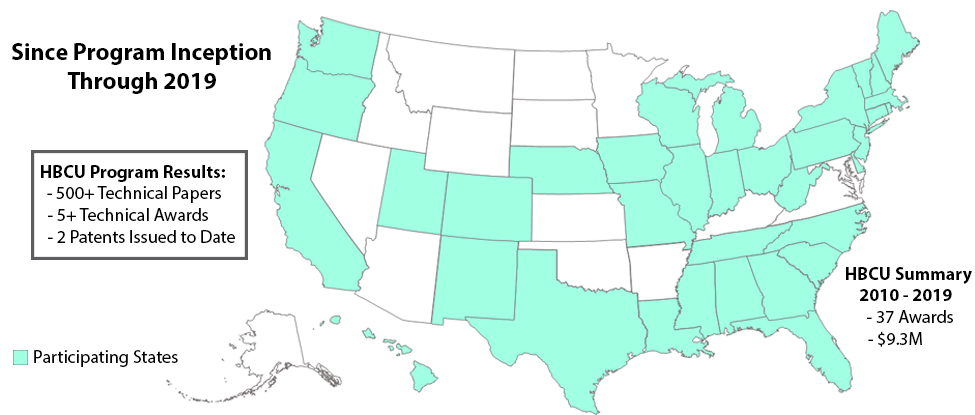
The University Training and Research (UTR) program comprises two long-running university training programs that prepare the next generation of scientists and engineers to meet future energy challenges. These are the University Coal Research (UCR) program and the Historically Black Colleges and Universities and Other Minority Institutions (HBCU-OMI) program. By working with students at the university level, the efforts ensure that key technologies in areas including advanced manufacturing, cybersecurity, smart data analytics, and high-performance computing will be integrated into fossil plants of the future. This program upholds the DOE’s mission by supporting long-term, high-risk meritorious fundamental research that advances the science of coal technologies at eligible U.S. colleges and universities.
Since 2010, NETL has awarded 104 projects, a total of $33,840,649, through the University Training and Research program. A yearly breakdown is shown in Figure 1.

In FY 2019, 105 students were affiliated with the University Training and Research program. Of these students, 44 were affiliated with the HBCU-OMI program and 61 were affiliated with the UCR program.
A yearly webinar outlines the program objectives and mission to help students and institutions gain an in-depth understanding of how to prepare and submit proposals. The program sponsors the education, training, and research capabilities in the fields of science and technology related to fossil energy resources. Annual Kickoff Meetings and Project Reviews allow for students to hone their presentation skills, demonstrating their own research, findings and status of all active projects.
The program provides a mechanism for cooperative research among minority-focused institutions, the private sector, and Federal agencies. The central thrust of the program is to generate fresh ideas and tap unique talent, define applicable fundamental scientific principles, and develop advanced concepts for generating new and improved technologies across the full spectrum of fossil energy R&D programs. Since its inception, the program has emphasized improving the energy and environmental capabilities of advanced coal, oil, gas, and environmental technology concepts. The program supports DOE’s Strategic Plan to advance domestic and global industrial competitiveness, clean energy research, national security, diversity initiatives, and environmental quality.
Since its inception in FY1979, the UCR Program has maintained three objectives, to be achieved simultaneously, which are: (1) sustain a national university program of research in energy and environmental science and engineering related to coal through innovative and fundamental investigations pertinent to coal conversion and utilization; (2) to maintain and upgrade the coal research capabilities and facilities of U.S. colleges and universities; and (3) to support the education and training of our next generation of scientists and engineers.

Historically, the involvement of professors and students has been an essential element in the success of the UCR Program. The participation of students is valuable because it serves to promote the influx of fresh ideas, and it ensures continued training of future scientists and engineers. Generally, four to seven competitively selected grants are awarded annually. In addition, each participating university is required to provide research education for at least one student. View New Projects in 2020!
Work conducted in this program enables segments of the college population, not typically tapped for educational research in these subject areas, to advance technical skills and provide a meaningful contribution to the Fossil Energy Program. Thus, grants awarded under this program are intended to maintain and upgrade educational, training, and research capabilities of HBCUs and OMIs in the fields of science and technology related to fossil energy resources. The key purpose of this program is to involve professors and students. Essential to the success of this program are (1) the collaborative involvement of HBCU-OMI professors and students along with the commercial sector; and (2) the establishment of linkages between the HBCU-OMI and private sector fossil energy community in the development and execution of fresh research ideas. Approximately three to four competitively selected grants are awarded annually. Each participating university is required to provide research education support for at least one student. View New Projects in 2020!

As of the third quarter of FY 2020, there are 30 active University Training and Research projects. These projects are the product of six different Funding Opportunity Announcements (FOAs).
The University Training and Research project portfolio spans a wide array of technologies. Half of the projects focus on sensors, controls, novel concepts, or cybersecurity research. These projects are part of the Crosscutting Research Sensors and Controls program. UTR projects in this program focus on five different research areas:
The remaining half of the projects are performing research relevant to Crosscutting Research’s High Performance Materials, Water Management, or Modeling, Simulation, and Analysis programs. The High Performance Materials projects focus on two research areas:
UTR projects that are part of the Modeling, Simulation, and Analysis program focus on two research areas:
Water Management projects are focusing on two research areas:
Together, the projects within the University Training and Research program are educating the next generation of scientists and engineers and helping to advance innovative and fundamental research focused on coal-based, fossil energy resources.
In the first quarter of FY2020, the National Energy Technology Laboratory released a new FOA (DE-FOA-0002193) soliciting projects for the University Training and Research Program. The FOA had the following four areas of interest:
To sustain a healthy economy and remain competitive internationally, the United States will need a highly-skilled workforce, which includes competent and dedicated scientists, engineers, and managers in technical fields. It will need not only advanced technology markets, but also knowledge of and sensitivity for culturally diverse customers and business partners.
